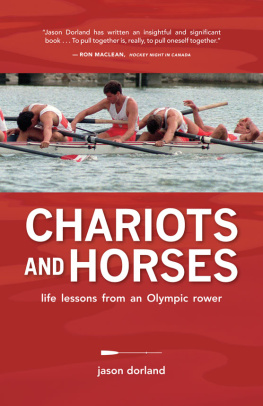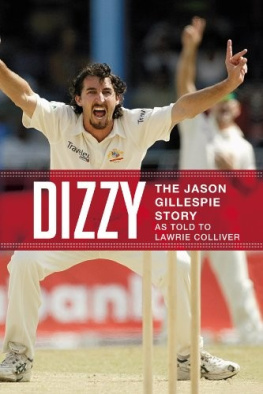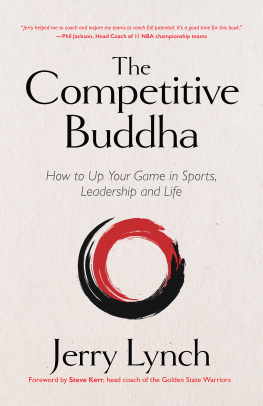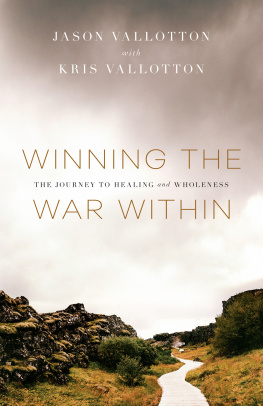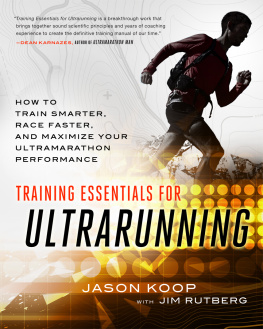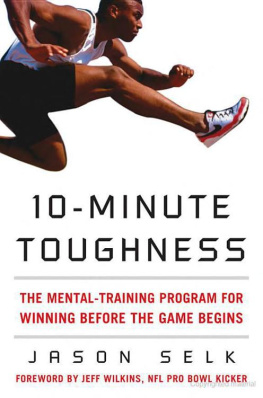
Introduction
My experiences as a young boy, teenager and eventually as an elite athlete all embodied the notion that there was one point to competition and that was to beat the living daylights out of your competitors. Maybe it was because I was the last of four children, born into a family that enjoyed and participated in many sports. My dad was a teacher, coach and housemaster at Ridley College, an independent boarding and day school in southern Ontario. My two brothers, my sister and I grew up on a campus that had a pool, two gyms, a rink, squash courts, tennis courts and acres and acres of playing fields and wooded areas. In the summertime wethe staff bratsowned it all.
I cant, even for a moment, imagine a better way to have grown up. From morning until the last bit of daylight, we played football, baseball, tennis, squash, swimming, hide and seek. You name it, we probably played it. Even at night, once we were old enough, we played flashlight tag. We were active, healthy and too busy to get into trouble. My siblings were significantly older than I was. Emotionally and physically, they were always way ahead of me in their development. When youre six and your next-oldest brother is eleven, your sister is thirteen, and your oldest brother is sixteen, you are at a considerable disadvantage when it comes to competition. As I grew older, I got bigger but I certainly never caught up. They were always bigger and stronger.
Its important for you to know that my parents never pushed me or my siblings to get involved with or stay in sports. Sometimes I wish they had taken a greater interest in my sports. I think it was just two parents trying to stay impartial and not come across as being any more excited about one childs success versus anothers.
As a teenager and young man growing up in St. Catharines, Ontario, our dad had been a bit of a jock. In fact, before the Second World War, the Chicago White Sox had scouted him as a pitcher. After the war he enrolled at McGill University, where he studied physical education. He played on numerous varsity teams, everything from basketball and baseball to boxing and wrestlinghe was a varsity champion. After the war he followed his father before him and joined the St. Catharines rowing club and won a Canadian Henley Championship as a lightweight.
The sportsmanship code that Dad had grown up with, and the one that Ridley used as its motto for its sports program, was, If you lose, say nothing. If you win, say less. That philosophy, which continues today, began with the Ridleys first headmaster, Dr. Harry Griffith. At any rate, it worked for Dad and we were constantly reminded of its value. It just didnt always apply when siblings were involved. In fact, if us boys got too rowdy, he would deliver his standard, Gosh, boys. Cut it out!
You see, my brothers, Scott and Paul, saw everything between them as a competition, and most of the time it wasnt friendly. They certainly never came to blows, but you could tell they took every game seriously, with each of them striving for the bragging rights that came with winning. Several times the bragging turned into one-upping banter, and my sister, Wendy, the peacemaker, would often chime in and tell them to cool it, but she was just as competitive. She was strong, athletic and liked taking it to her brothers any chance she could get.
My oldest brother, Scott, was always organizing events, which involved everything from Ping-Pong tournaments to hockey games to croquet matches. Yes, croquetonly with special rules. We called it Killer Croquet. The course was laid out over an enormous expanse of land and, instead of the usual polite tap that you sometimes dealt your competition, you were encouraged to bash the crap out of each others balls. There was nothing polite and proper about Killer Croquet. It was all-out war, and I usually got killed.
In fact, no matter what the game or event, I came out the loser. After many of our competitions I would go to my room in a rage and crawl under my bed and cry. I wasnt mad at my brothers; I was pissed off at myself. I used to tell myself, You have to try harder. You have to find a way to win.
I was always good at keeping my emotions to myself, but on the odd occasion when my brothers would ease off during games or races and let me win, I would lose my temper. I wasnt a charity case and I didnt want, nor did I think I needed, their help. I understood that they were doing it to be nice, but I hated it. Stop it! I would yell. I dont want to win that way!
Along with the homegrown tournaments and pickup games, all four of us were also involved in organized sports. We belonged to sports leagues and clubs outside of our school teams. We all swam for the St. Catharines Swim Club. Scott and Wendy were both excellent swimmers and won countless races and titles. By the time I had joined, I had a name to live up to. Even though my siblings were long gone from the pools, I was still competing against them. I wore the pressure of those expectations all of the time. It didnt come from them or from my parents. It was never discussed at home or in the car going to and from meets. It was just something that I had created.
I loved training. Life was great when swimming meant I could just focus on pushing myself during practice. But come race day, I was a wreck. I would get so nervous, I felt sick all day long. The thought of not winning was unbearable. I would sooner not race than lose. At one large regional championship meet, I hid in a locker in the change room just before my race was called, and I stayed in there, waiting until it was over. To this day, I still get nervous when I walk into a sports complex and I smell a pool.
Basically, Im a terrible loser. I always have beenfrom my youth, through my high school racing, through my Olympic experience and my coaching. Even though as a coach its been my job to ensure that I role-model a cool-headed, composed and professional individual who strives to teach his athletes that there is more to life than winning, inside I have struggled all my life to understand what exactly that is.
For as long as I could remember, winning was the goal of every race. The first time I saw the impact of winning was in a running race against my Grade 2 teacher, Mrs. Hawkins. One afternoon our class was engaged in running races and I had won all of mine. Someone yelled out, You race Jason, Mrs. Hawkins. The rest of the students joined in and coerced her into racing me. I won. The other students were so impressed that I had run faster than our teacher.
Wow, you beat Mrs. Hawkins. Youre fast, someone said.
I can still remember how important I felt. I believed I had just done something special, and that feeling stayed with me so strongly and so long that it created demons with which I have done battle over and over again.
This story is about fighting those demons, about how they got inside my head and about how, with the help of some amazing peopleone in particularI have learned to keep them at bay. Along the way I have become a better competitor, a better coach and, ultimately, a better person. I hope that by sharing my story, you may continue to develop a greater appreciation for and greater understanding of the reality that there is more to sport, to business and to life, than just winning.
Jason Dorland
St. Catharines, Ontario, 2011
1

The Seoul Olympics
Travelling to Seoul was an exhausting trip that crossed seven time zones. The general rule is that you need one day of recovery for every time zone, so we arrived two weeks early. With regularly scheduled meals and daily exercise, we quickly acclimatized ourselves to the local time and weather, and became familiar with the rowing venue.
Next page
